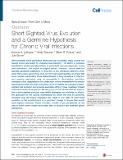Short-sighted virus evolution and a germline hypothesis for chronic viral infections
Abstract
With extremely short generation times and high mutability, many viruses can rapidly evolve and adapt to changing environments. This ability is generally beneficial to viruses as it allows them to evade host immune responses, evolve new behaviours, and exploit ecological niches. However, natural selection typically generates adaptation in response to the immediate selection pressures that a virus experiences in its current host. Consequently, we argue that some viruses, particularly those characterised by long durations of infection and ongoing replication, may be susceptible to short-sighted evolution, whereby a virus’ adaptation to its current host will be detrimental to its onward transmission within the host population. Here we outline the concept of short-sighted viral evolution and provide examples of how it may negatively impact viral transmission among hosts. We also propose that viruses that are vulnerable to short-sighted evolution may exhibit strategies that minimise its effects. We speculate on the various mechanisms by which this may be achieved, including viral life history strategies that result in low rates of within-host evolution, or the establishment of a ‘germline’ lineage of viruses that avoids short-sighted evolution. These concepts provide a new perspective on the way in which some viruses have been able to establish and maintain global pandemics.
Citation
Lythgoe , K A , Gardner , A , Pybus , O G & Grove , J 2017 , ' Short-sighted virus evolution and a germline hypothesis for chronic viral infections ' , Trends in Microbiology , vol. 25 , no. 5 , pp. 336-348 . https://doi.org/10.1016/j.tim.2017.03.003
Publication
Trends in Microbiology
Status
Peer reviewed
ISSN
0966-842XType
Journal article
Description
This work was funded by The Wellcome Trust and The Royal Society grant numbers wtvm055984 (KAL) and 107653/Z/15/Z (JG), The Natural Environment Research Council grant number NE/K009524/1 (AG), and The European Research Council under the European Union’s Seventh Framework Programme (FP7/2007-2013)/ERC grant number 614725-PATHPHYLODYN (OGP).Collections
Items in the St Andrews Research Repository are protected by copyright, with all rights reserved, unless otherwise indicated.

